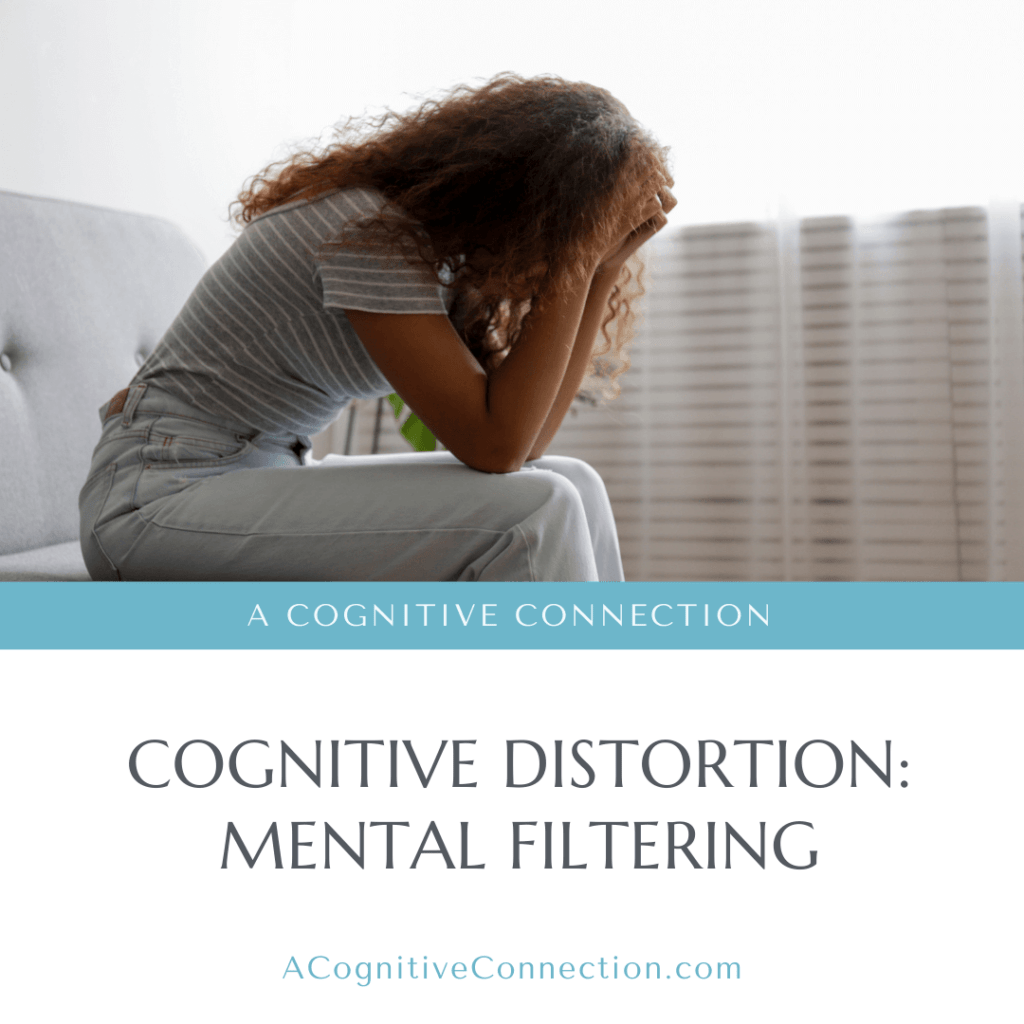Do you tend to always see the glass half-empty? Or maybe one negative interaction at a grocery store can make you forget the other people who smiled at you and acted politely.
Now, we all struggle with this from time to time. A few inconveniences on a bad day can make us feel like nothing will ever go right again. But what happens when you can only ever see the negative things that happen to you?
This is actually a rather common cognitive distortion in people who experience anxiety or depression and is called mental filtering. Mental filtering occurs when people struggle to see the whole picture and can only focus on the negative.
At A Cognitive Connection, we help people who struggle with unhelpful patterns of thinking and behavior find relief. We provide a range of therapies that can help you live the life you want, including cognitive behavioral therapy which can help address negative thought spirals.
Cognitive Distortion Definition
Before we dive deeper into mental filtering, let’s take a moment to define cognitive distortions. According to the APA, a cognitive distortion is simply “faulty or inaccurate thinking or belief.”
We’re all wrong on occasion, and cognitive distortions are actually psychologically expected at lease sometimes.
Cognitive distortions range from the innocuous, like overgeneralization, to things like mental filtering that can hurt your mental health if not addressed.
For more examples of cognitive distortions, visit our blog on “What are Cognitive Distortions?”
What Is Mental Filtering?
Just like any other kind of filter, a mental filter lets some things through and keeps other things out. But instead of filtering contaminants out of water, for example, a mental filter can remove all of the good things from your day. In short, people with mental filters focus on negative aspects while ignoring positive ones.
Examples of Mental Filtering
Here are some examples of mental filtering to make things a bit clearer:
Let’s say you’re a straight-A student and receive a C on one of your reports. With this cognitive distortion, you would ignore all of the assignments where you’ve received good grades and tell yourself that you’re a horrible student. In reality, you are an intelligent student who didn’t have the ideal results for one of your exams.
OR
You’re a good worker who normally meets their deadlines, but you forgot to finish a report for one of your bosses. So you might think something like, “I can’t do anything right,” or “Why can I never meet my deadlines?”
OR even
Your partner makes a mistake. When they try to make it up to you, you can only focus on what they did wrong instead of the nice things they’re doing now.

Consequences Of Mental Filtering
Having a sustained negative view of yourself can lead to serious side effects. When you have reoccurring negative thought patterns, it can result in depression, low self-esteem, and a pessimistic view of the world. And unfortunately, when you struggle with mental filtering, you probably look at your loved ones through a negative lens, which can damage your relationships.
It can also be a hard-to-escape cycle—your negative outlook results in a poor mood, which leads to more mental filtering. Since mental filtering is common in people with depression, cognitive behavioral therapy for depression often includes helping them recognize their mental filtering patterns.
How To Overcome Mental Filtering
If you struggle with mental filtering, journaling can be a good place to start. When you write down your thoughts, it’s easier to see patterns. You can also look back when you feel calmer and brainstorm another way to think about the situation.
You can even take it a step further and make an argument for why that thing that happened was actually good. Challenge yourself to replace harmful thoughts with positive ones so your brain gets used to recognizing when good things happen.
Another good practice is to give yourself a mantra. For example, if you frequently struggle with a similar negative thought, like “Nobody likes me,” create a short phrase that counters that, like, “I am loved.”
Though these exercises can be helpful on their own, if mental filtering is a constant battle, working with a therapist can help you see faster improvements.
Overcome Your Distorted Thinking With A Cognitive Connection
Whether you’re battling mental filtering or another form of distorted thoughts, A Cognitive Connection is here to support you throughout your journey and give you the tools to improve your thinking. Living with cognitive distortions can be overwhelming, emotionally draining, and isolating. To take back control of your life and learn how to overcome your distorted thinking, contact the team at A Cognitive Connection today!


